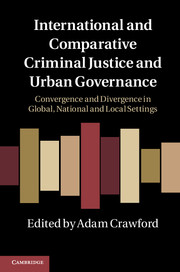 International and Comparative Criminal Justice and Urban Governance
International and Comparative Criminal Justice and Urban Governance Book contents
- Frontmatter
- Contents
- List of figures
- List of tables
- Notes on contributors
- Acknowledgements
- 1 International and comparative criminal justice and urban governance
- PART 1 International criminal justice
- PART 2 Comparative penal policies
- 8 Penal comparisons: puzzling relations
- 9 Why globalisation doesn't spell convergence: models of institutional variation and the comparative political economy of punishment
- 10 Penal excess and penal exceptionalism: welfare and imprisonment in Anglophone and Scandinavian societies
- 11 The impact of multi-level governance on crime control and punishment
- 12 Explaining Canada's imprisonment rate: the inadequacy of simple explanations
- 13 US youth justice policy transfer in Canada: we'll take the symbols but not the substance
- 14 Liberty, equality and justice: democratic culture and punishment
- PART 3 Comparative crime control and urban governance
- Index
- References
9 - Why globalisation doesn't spell convergence: models of institutional variation and the comparative political economy of punishment
from PART 2 - Comparative penal policies
Published online by Cambridge University Press: 05 June 2011
- Frontmatter
- Contents
- List of figures
- List of tables
- Notes on contributors
- Acknowledgements
- 1 International and comparative criminal justice and urban governance
- PART 1 International criminal justice
- PART 2 Comparative penal policies
- 8 Penal comparisons: puzzling relations
- 9 Why globalisation doesn't spell convergence: models of institutional variation and the comparative political economy of punishment
- 10 Penal excess and penal exceptionalism: welfare and imprisonment in Anglophone and Scandinavian societies
- 11 The impact of multi-level governance on crime control and punishment
- 12 Explaining Canada's imprisonment rate: the inadequacy of simple explanations
- 13 US youth justice policy transfer in Canada: we'll take the symbols but not the substance
- 14 Liberty, equality and justice: democratic culture and punishment
- PART 3 Comparative crime control and urban governance
- Index
- References
Summary
[W]e are confronted with results in comparative political economy which undermine the assumptions of mainstream comparative law about ‘convergence’ and ‘functional equivalence’… Against all expectations that globalization of the markets and computerization of the economy will lead to a convergence of legal regimes and to a functional equivalence of legal norms in responding to their identical problems, the opposite has turned out to be the case. Against all talk of ‘regulatory competition’ which is supposed to wipe out institutional differences, legal regimes under advanced capitalism have not converged.
Teubner 2001: 433In the last decade, there has been a welcome revival of criminal justice scholarship which engages with the macro-level political–economic forces which are shaping criminal justice policy in western democracies. Many of these accounts are rooted in the global economic changes which began in the 1970s – recession, the contraction or even collapse of manufacturing industries, the growth of unemployment and the creation of a large sector of people either long-term unemployed or employed in insecure forms of work. These changes, it is argued, have eroded the consensus which sustained post-war penal welfarism. As significantly rising recorded crime across Western countries gradually produced a situation in which the experience of criminal victimisation, and of managing the risk and fear of crime, became normal features of everyday life for the economically secure, crime became an increasingly politicised issue, generating a ‘penal populism’ which brought in its wake a combination of repressive and managerial criminal justice strategies.
- Type
- Chapter
- Information
- International and Comparative Criminal Justice and Urban GovernanceConvergence and Divergence in Global, National and Local Settings, pp. 214 - 250Publisher: Cambridge University PressPrint publication year: 2011
References
- 17
- Cited by


